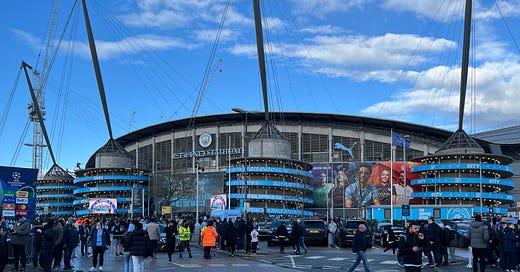As the Premier League kicks off, it could be a season like no other
The on-pitch stuff looks pretty familiar, but what happens in the courts looms large. PLUS: What do the Jays do with Bo, and yet another hockey lawsuit
The Premier League began a new season this past weekend, and everything felt very much as it was. Manchester City cruised to victory. Liverpool and Arsenal had tidy wins that suggested they remain the two teams most likely to give imperious City a run at the title. Manchester United needed a late winner to avoid a first-week embarrassment at home. Chelsea lost to City, which is no reason for crisis on its own, but did so with a squad that has again been bloated by a summer of spending and seems impossible to manage.
So, a lot of familiar storylines.
But the backdrop to all that are financial investigations that could blow up whatever happens on the pitch. I can’t think of any equivalent to it in North American sport, unless you count seasons that have been disrupted by labour disputes.
Two of the biggest clubs in the league, Chelsea and Manchester City, are subject to separate probes. Chelsea has essentially confessed to having submitted incomplete financial information between 2012-2019, when under the ownership of Russian oligarch Roman Abramovich. Clubs are required to hand over financial statements to show their net profit/loss, because they are only supposed to spend what they bring in, more or less. There are no salary or spending caps in English football, but the rules are intended to prevent clubs from spending wildly beyond their means. Someone like Abramovich, a billionaire who didn’t care if Chelsea FC actually made a profit, could have increased the club’s spending power by hiding losses elsewhere. Which might be what he did. When he was forced to sell by the U.K. government after the Russian invasion of Ukraine, the new owners, including the American co-owner of the Los Angeles Dodgers, said that the books for a number of years seemed incomplete.
If found guilty, the punishment could be steep: Everton and Nottingham Forest were dinged with points deductions last season for relatively minor cases of overspending. Chelsea’s potential breaches have the added element of subterfuge, albeit by an owner who is no longer part of the club. One possibility is a transfer ban, which might explain why the new owners have been buying up players like they are high on goofballs — because they anticipate a long stretch where they won’t be able to make any additions to the squad.
But the Chelsea situation, ominous though it is, is actually less daunting than that of Manchester City. Champions in each of the last four season, they were hit with 115 charges of breaching financial rules, again dating back to the previous decade. It’s all very complicated, and City maintains its innocence, but the simplified version is they are accused of inflating their income with above-market sponsorship deals. City is owned by the Abu Dhabi royal family, and some of their business partners are, surprise, United Arab Emirates businesses like Etihad Airways, which sponsors both their jerseys and stadiums. I’m just making up numbers here to illustrate how it would work, but say the market value of a kit sponsorship is $50-million. If Etihad Airways pays $100-million, that’s an extra $50-mil that City can spend on players. Why would Etihad Airways pay double the market rate? Because it’s owned by the same sheikh who owns the football club.
Again, City disputes all of this, and some of the information at the root of the charges came into the public domain through a computer-hacking scandal, but if the club is found to have engaged in shenanigans the potential penalties would be massive. Everton was docked eight points over one breach. City’s, in theory, cover many seasons in a row and, again, have that whiff of a coverup. Could it be 20 points? 50? City are both favoured to win the league and are only 13-1 odds to be relegated. (Arsenal and Liverpool are both 100-1 to be relegated.)
City’s charges date to about two years ago, and for reasons I don’t really understand it has taken this long for a British court to hear an appeal. In the meantime, they won two more Premier League titles, a Champions League trophy and an an FA Cup. But the hearing is reportedly scheduled to begin next month and should be over before the end of the year. And, weirdly, it promises to be the most important match day of all.
Oh, Bo?
There were reports yesterday that the Toronto Blue Jays intend to shop Bo Bichette this winter because he has no intention of signing a deal to stay with the club beyond 2025, when he hits free agency.
As it happens, I wrote last week on Bichette for theScore, arguing that it would be good for all sides for Bichette to at least have a decent month to end the season. That is especially true if the Jays hope to trade him, but I’m not at all convinced they would. the 2025 season is shaping up as a last-kick-at-the-can thing for this team (and possibly front office) and the best bet might be hoping that Bichette bounces back in a contract year, even if he then departs for riches elsewhere.
Add another lawsuit to the junior hockey pile
My other recent piece for theScore looks at yet another lawsuit against the authorities governing junior hockey, this one from a former player who alleges that the NCAA’s ban on former CHL players violates antitrust laws. In an era in which U.S. college athletes can now make millions of dollars in sponsorship money, it’s odd that the NCAA’s hockey rules haven’t been changed yet. It’s also one of many ways in which hockey’s decades-old approach to amateurism in its junior ranks may be changing.




